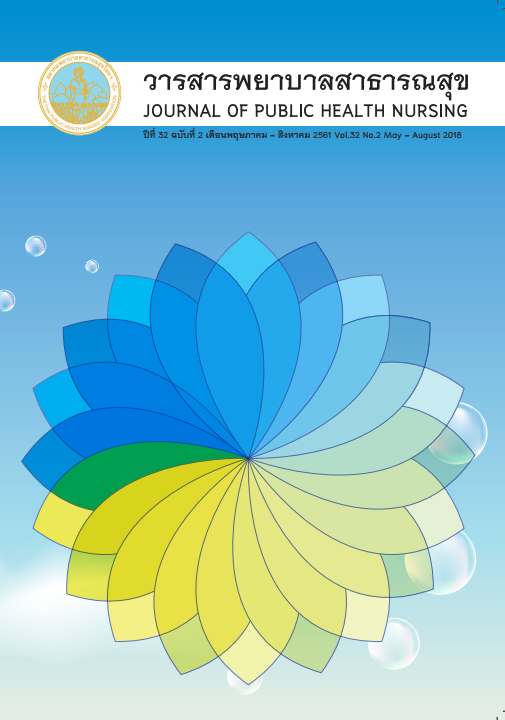ผลของโปรแกรมส่งเสริมพฤติกรรมการควบคุมความดันโลหิต ในกลุ่มอายุ 35-59 ปี ที่ ควบคุมความดันโลหิตสูงไม่ได้
คำสำคัญ:
ความรู้, แรงจูงใจ, การรับรู้, พฤติกรรมควบคุมความดันโลหิต, ระดับความดันโลหิตบทคัดย่อ
โรคความดันโลหิตสูงเป็นสาเหตุสาคัญของการเสียชีวิตก่อนวัยอันควรของผู้ป่วยในกลุ่มอายุ 35-59ปี ที่ไม่สามารถควบคุมความดันโลหิตได้จึงทำให้เส้นเลือดแดงถูกทำลายและแข็งเกิดภาวะแทรกซ้อนทางสมอง หัวใจและไตได้ การวิจัยนี้เป็นการวิจัยกึ่งทดลองในรูปแบบสองกลุ่มแบบวัดซ้ำ มีวัตถุประสงค์เพื่อศึกษาผลของโปรแกรมส่งเสริมพฤติกรรมการควบคุมความดันโลหิตของผู้ป่วยในกลุ่มอายุ 35-59 ปีที่ไม่สามารถควบคุมความดันโลหิตได้ในคลินิกโรคความดันโลหิตสูง โรงพยาบาลคลองลาน จ.กำแพงเพชร โดยประยุกต์ใช้ทฤษฎี Information-Motivation- Behavioral skill model แบ่งเป็นกลุ่มทดลอง และกลุ่มเปรียบเทียบ กลุ่มละ 26 คน ใช้ระยะเวลา 7 สัปดาห์ โดยกลุ่มทดลองได้รับข้อมูลข่าวสารความรู้เกี่ยวกับผลกระทบจากภาวะแทรกซ้อนของโรคความดันโลหิต และการควบคุมความดันโลหิต การเสริมสร้างแรงจูงใจทางบวกทั้งภายในและภายนอก เพื่อให้มุ่งมั่น ตั้งใจการควบคุมความดันโลหิตการรับรู้ความสามารถตนเอง และพัฒนาทักษะพฤติกรรม รวบรวมข้อมูลโดยใช้แบบสอบถามที่ตอบด้วยตนเอง ก่อนทดลอง หลังทดลอง และติดตามผล วิเคราะห์ข้อมูลด้วยการแจกแจงความถี่ จำนวนร้อยละ การทดสอบค่าที (Paired t- test, Independent t- test) และRepeated Measures ANOVA ผลการวิจัยพบว่าหลังเข้าร่วมโปรแกรมกลุ่มทดลอง มีคะแนนเฉลี่ยความรู้ แรงจูงใจ และการรับรู้มากกว่า ก่อนเข้าร่วมโปรแกรม และมากกว่ากลุ่มเปรียบเทียบอย่างมีนัยสำคัญทางสถิติ (p <0.05) และในระยะติดตามผล กลุ่มทดลองมีคะแนนเฉลี่ยของพฤติกรรมการควบคุมความดันโลหิต และระดับความดันโลหิตดีขึ้นกว่าก่อนทดลอง และดีขึ้นกว่ากลุ่มเปรียบเทียบอย่างมีนัยสำคัญทางสถิติ (p <0.05) ผลการวิจัยครั้งนี้สนับสนุนผลการประยุกต์ใช้ทฤษฎี Information-Motivation-Behavioral skill model ในการส่งเสริมพฤติกรรมการควบคุมความดันโลหิตของผู้ป่วยความดันโลหิตสูงที่ควบคุมความดันโลหิตไม่ได้โดยพยาบาลสาธารณสุขที่ปฏิบัติงานในชุมชนสามารถนำรูปแบบมาใช้เป็นแนวทางในการส่งเสริมให้ผู้ป่วยโรคความดันโลหิตสูงสามารถควบคุมความดันโลหิตของตนเองให้อยู่ในเกณฑ์ได้และไม่เกิดภาวะแทรกซ้อน
เอกสารอ้างอิง
World Health Organization [Internet]. [cited 2015 Jan 16 ]. A global brief on hypertension; 2013.Available from: http://www.who.int/cardiovascular_diseases/publications/global_brief_hypertension/en/
World Health Organization [Internet]. [cited 2015 Jan 16 ]. World health statistics all right reserved. available on the WHO; 2012. Available from: http//www.who.int
Wrongdiagnosis. Aboutprevalent and incidence statistics [Internet]. [update 2006; cited 2015 Jan 16 ]. Available from: https://www.wrongdiagnosis.com/admin/preval.htm#rate.
Department of communicable disease control. Global Campaign on High Blood Pressure Day 2016 [Internet].[cited 2017 January 16]. Available from http://www.thaincd.com/document/file/.pdf (In Thai)
Ministry of Public Health Summary of the disease surveillance report.[Internet]. 2015 [cited 2016 January 18]. Available from http://www.boe.moph.go.th/Annual/AESR2015/aesr2558/hypertension.pdf (In Thai)
Hypertension association of Thailand guidelines in general practice 2012, update 2015.[Internet]. [cited 2015 January 16]. Available from http://www.slideshare.net/UtaiSukviwatsirikul/2558-55823263 (In Thai)
Buranakitcharoen P. Primary hypertension. Bangkok: Folk healers; 2010.(In Thai)
Office of policy and Strategy ministry of public health. Summary of key statistics for 2013. [Internet]. [cited 2015 January 16]. Available from https://www.msociety.go.th/article_attach/11378/15693.pdf (In Thai)
RangsinR. Full research reports evaluation of hypertension in hospitals, Bangkok. NHSO; 2012.[Internet].[cited 2015 January 16].Available from http://www.tima.or.th/index.php/component/attachments/ (In Thai)
Kamphaengphet provincial health office.Chronic non- chronic disease information.[Internet]. [cited 2015 January 16]. Availablefromhttps://ncd.kpo.go.th/chronic/. (In Thai)
Khonlan Hospital. NCD quality clinical quality assessment report; 2014
Fisher, J.D., & Fisher, W.A. Changing aidsrisk behavior. Psychological Bulletin. 1992: 463-64
Chandra Y. Osborn and Leonard E. Egede. Validation of an informationmotivation-behavioral skills model of diabetes self –care (IMB-DSC). Patient Educ. Couns. 2010 April; 79(1), 49-54.
Gleason-Comstock, J. Patient education and follow-up an intervention for hypertensive patients discharged from an emergency department: a randomized control trial study protocol. BMC Emergency Medicine. 2014, 15-38.
TwiskJos W. R. [Internet].[Retrieved Jan 16, 2015]. Applied longitudinal data analysis for epidemiology. New York, 2003; 281-82.
Pongpiriyamaitree. V. The effect of anapanasati meditation practice and home self-care on stress in the elderly with essential hypertension, Journal of Nongkhai Campus.2010. 5(1-2), 79-86.
Smith, P.J., Blumenthal, J.A., Babyak, M.A., Craighead, L., Kathleen A. Welsh-Bohmer, Browndyke, J. N., et.at. Effects of the dietary approaches to stop hypertension diet, exercise,and calloricrestriction on neurocognition in overweight adults with high blood pressure. NIH public hypertension. 2008.55(6), 1331-38.
TansakulS.Presented at the 17thNational health education conference.Behavioral sciences and behavior development[Internet]. 2015. [cited 2016 March 12]. Available from http://www.hepa.or.th/.pdf (In Thai)
ดาวน์โหลด
เผยแพร่แล้ว
รูปแบบการอ้างอิง
ฉบับ
ประเภทบทความ
สัญญาอนุญาต
บทความที่ตีพิมพ์และแผนภูมิรูปภาพถือเป็นลิขสิทธิ์ของวารสารพยาบาลสาธารณสุข (Thai Public Health Nurses Association)







